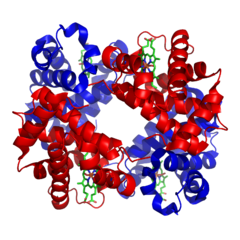This is an old revision of this page, as edited by 7mike5000 (talk | contribs) at 08:21, 19 April 2010 (Added information and refernces, the article previously only had one sentence.). The present address (URL) is a permanent link to this revision, which may differ significantly from the current revision.
Revision as of 08:21, 19 April 2010 by 7mike5000 (talk | contribs) (Added information and refernces, the article previously only had one sentence.)(diff) ← Previous revision | Latest revision (diff) | Newer revision → (diff)
Hb Lepore trait (A/HbLepore) is typically an asymptomatic hematologic condition, which results due to a genetic mutation. The Lepore globin gene occurs due to a "crossover" between the delta and beta globin gene loci and was first identified in an Italian family in 1958.
The Hb Lepore trait has a worldwide distribution with three main varieties having been defined Washington-Boston and Baltimore which can be found in various ethnic groups but typically affects southern europeans such as Italians and Greeks, and people from the Balkan countries such as Yugoslavians and Rumanians, a rare case of the Baltimore variety was discovered in an African American woman in the Bronx in New York City and dubbed Hn Lepore-Bronxand another variety was discovered in the city of Saskatoon in the province of Saskatchewan, Canada and dubbed Hb E-Lepore Saskatoon [[The Hollandia variety has been identified in Papua New Guinea and Bangladesh. All three varieties show similar electrophoretic and chromatographic properties Hematological findings bear close resemblance to those of th beta-thalassemia trait.
The homozygous state for Hb Lepore is rare. Patients of Yugoslavian descent tend to have the most severe presentstion of syptoms including severe anemia during the first five years of life. They also presented with significant splenomegaly, hepatomegaly, and skeletal abnormalities identical to those of homozygous beta-thalassemia. Management included a regular course of blood transfusion. The amount of Hb Lepore in the patients blood ranged from 8 to 30 %, the remainder being Hb F.
Lepore/beta-thalassemia is analogous to beta-thalassemia major, however the clinical course is variable. Patients with this condition typically present with severe anemia during the first two years of life. Normal growth and development can occur, with frequent transfusions to maintain a hemoglobin level above 11g/dl. Chelation therapy is often necessary to control the accumlation of iron from the tranfusions. Levels of Hb Lepore are thus synthesized in a reduced amount with the levels of Hb Lepore in heterozygotes ranging from 5 to 15%. The heterozygote form is mildly anemic (Hb 11-13 g/dl) but presents with a significant hypochromia (deficiency of hemoglobin in the red blood cells) and microcytosis.
References
- McKeown SM. et al. Rare occurrence of Hb Lepore-Baltimore in African Americans: molecular characteristics and variations of Hb Lepores. Ann Hematol. 2009 Jun;88(6):545-8. Epub 2008 Nov 7.PMID 18989669
- Ropero P. et al. The first case of Hb E-Saskatoon associated with Hb Lepore-Baltimore found in Spain.Hemoglobin. 2005;29(3):215-9.PMID 16114185
- Ricci G, Scutellari PN, Franceschini F, Gualandi G (1982). "". Minerva Med. (in Italian). 73 (5): 191–7. PMID 7063135.
{{cite journal}}: Unknown parameter|month=ignored (help)CS1 maint: multiple names: authors list (link) - Efremov GD. et al.An individual with Hb-Lepore-Baltimore- delta beta-thalassaemia in a Yugoslavian family.Scand J Haematol. 1976 Feb;16(2):81-9.PMID 1257702